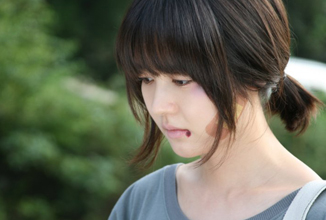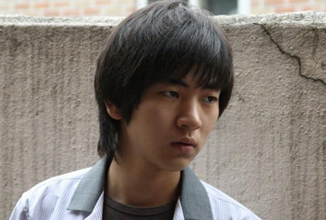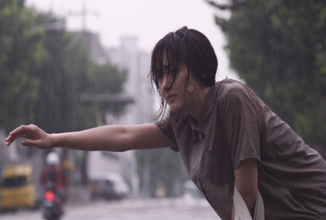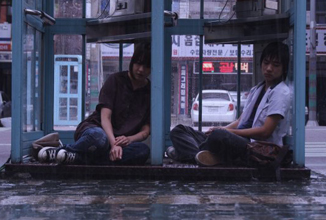 |
Synopsis:
Yoon-hee (Seong Yoo-ri) is a young woman deeply scarred psychologically by the fact that her brother died while saving her from drowning during a citywide flood a few years earlier, to the extent that her life has ground to a halt; her day-to-day thoughts are filled with little but guilt and self-blame; and she even finds it virtually impossible to go outside when it's raining.
Having been fired from her job for failing to turn up on a day of torrential rain, Yoon-hee takes up voluntary work in the local school canteen and on her very first day is shocked to come face-to-face with Jin-ho (Lee Joo-seung); a school bully who robbed her of her wallet (containing the only picture she had of her and her brother together), just a few days before.
Yoon-hee slowly builds up the nerve to demand that Jin-ho return the wallet but in response he dismisses her out of hand; refusing to even admit that he is indeed the thief. Utterly fuming, Yoon-hee decides to seek her own form of retribution and sets about making Jin-ho's day-to-day as difficult as possible for him but as their volatile interactions increase in frequency she begins to become aware of some of the reasons lying behind Jin-ho's violent thefts and abusive behaviour.
Though she faces a myriad of problems and sadistic violence in her own family life, Yoon-hee soon finds herself racing to steer Jin-ho away from a path of self destruction, above all else; fighting to save this boy who is gradually taking the place of her 'brother'...
Review:
A small flashback sequence detailing news reports of a young boy's death while saving his sister from drowning combines with early scenes of Yoon-hee watching torrential rainfall from her home (while telling her father she'll fetch the shopping when the weather improves) to leave viewers in no doubt as to both her damaged state of mind and her psychological scars without the need to extrapolate further with unnecessary present-day exposition, and while the (utterly brutal) violence she faces on an almost daily basis in her home life is wisely held back from viewers for a time it is nonetheless subtly referenced on more than one occasion as Yoon-hee and Jin-ho slowly begin to understand each other; the most initially thought-provoking instance of which is Yoon-hee's eye patch shifting from one eye to the other on subsequent days.
And while we're on the subject of violence: The sheer brutality of a number of scenes in 'A Boy's Sister' is on an utterly 'no-holds-barred' level to the extent that some sequences are frankly difficult to watch (and this comes from someone - me, obviously - who has seen an almost endless amount of Korean movie extreme violence) but that in no way implies that they are anything but entirely necessary to narrative depictions and themes and, in fact, their shocking nature adds not only to the gravitas of proceedings but also ensures they are unquestionably all the more gripping, as a direct result. Those of you who are familiar with Yang Ik-june's 'Breathless' will see several similarities in 'A Boy's Sister' both in terms of the sometimes seemingly endless, unrelenting beatings suffered by Yoon-hee at the hands of her drunken father (even though the specific number of these instances detailed is far fewer in this case) and the burgeoning relationship between a male (Jin-ho) whose life is increasingly surrounded, and even pervaded, by violence and a female victim of brutality (Yoon-hee) who gradually forms a deep, increasingly meaningful and spiritual (more on this, shortly) relationship with an individual who initially stands for everything she despises.
However, the humanity inherent to 'A Boy's Sister' is, to my mind, far greater and as such rather than being content with simply stating the idea of 'violence begets violence', the character arcs become cathartic journeys of the heart, mind and soul to a much larger degree; increasing viewer empathy (and even interest), in the process.
This difference in focus also allows 'A Boy's Sister' to reference the connection of others' perceptions and opinions to self worth and life success or failure, and dissect the effect of extraneous events and people on an individual's feelings about themselves, their lives and others; whether that effect be positive or deeply negative.
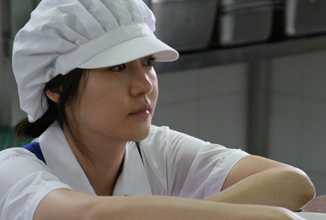 |
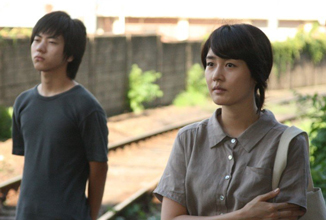 |
I've already mentioned the paralysing effect the rain has on both Yoon-hee's psyche specifically and her day-to-day life in general but that really is just the tip of the iceberg as far as the thematic references accentuated by the changes in the weather are concerned, throughout 'A Boy's Sister'. In fact, while initially the weather does affect Yoon-hee's mood, decisions and actions (or more accurately causes her inability to move forward), on more than one occasion the sky instead seems to follow Yoon-hee's thoughts and feelings, as if she's responsible for the altering temperament - when she's down, feeling lost or facing brutality, it rains; when she finds her connection to Jin-ho building, the sky somewhat brightens; when she discovers he is in danger, a torrential downpour begins, etc - all the while quietly and subtly adding to each thematic idea as well as underlining the growing understanding between Yoon-hee and her replacement 'brother' Jin-ho.
Not only that, but the weather and sky also play their part in the other major element/arc of A Boy's Sister's narrative; that of religion:
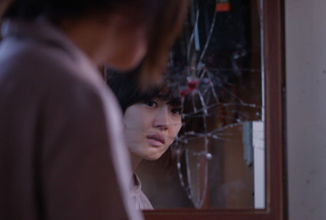 |
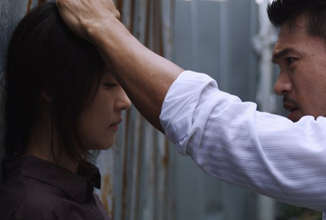 |
With religion being such a major theme of the film overall as well as standing both as the ultimate destination of Yoon-hee's character arc and the culmination of the narrative itself, it will come as little surprise to learn that its position within the ongoing story is fairly forcefully stated.
Beginning with a single religious work colleague of the school canteen staff being somewhat mocked in whispers and gossip behind her back for her insistence on saying Grace before eating and her repeated mentioning of prayers she's undertaken for those around her, the film subsequently includes dialogue implying that those very prayers have begun to be answered, and while the idea behind these references is both worthy and, some would say, necessary in the wider scheme of things I couldn't help but feel they were overstated more than once, even at times edging towards contrived. However, the importance of that same religious character and those very religious references to Yoon-hee's movement past the pain of her past and her changing self-perception are without question vital to proceedings as well as laying the foundation for the film's final 'hopeful' scene and, as such, the forcefulness with which they appear can be at least understood, even though I personally feel their depiction is the weakest aspect of the film.
As I've said, religion/prayer/faith and the repeated imagery of sky and weather combine in the final stage of 'A Boy's Sister' and here too they serve to produce a double-edged sword; being at the same time believably poignant, hopeful, spiritual and indeed deeply cathartic but once again overstating the underlying idea; this time in terms of the final imagery used even though that imagery does get its point across.
As a final point, Seong Yoo-ri agreed to appear in 'A Boy's Sister' without pay - in an effort to help the film be realised and made - and not only was that decision altruistic but it also ultimately allowed the film to raise its game. For, her performance as Yoon-hee is not just nuanced but exemplary throughout, standing head and shoulders above the other main cast members, and in the process it singlehandedly makes 'A Boy's Sister' as gripping as it ultimately is.
Cast:
Seong Yoo-ri, Lee Joo-seung, Lim Se-ho, Cha Sang-kyun
Directed by:
Lee Won-sik
Summary:
One moment moving and poignant, another brutal and difficult to watch, 'A Boy's Sister' is ultimately a gripping depiction of deep-seated pain, guilt and blame and though, to my mind, one theme in particular is rather unnecessarily overstated, the film overall deftly succeeds in its goals.
|
All images © Amuse and Junggam Films
Review © Paul Quinn
|
| |
|


